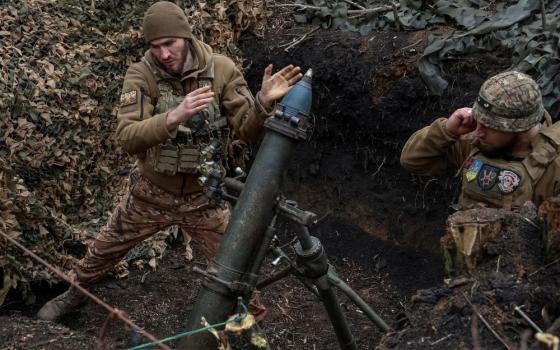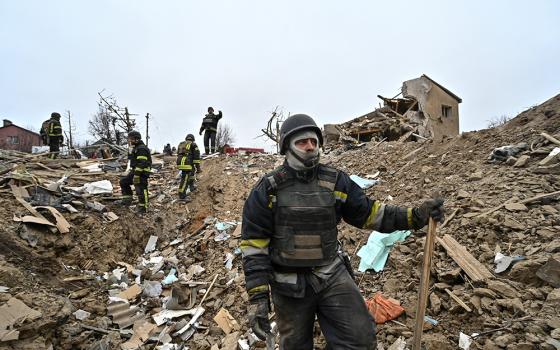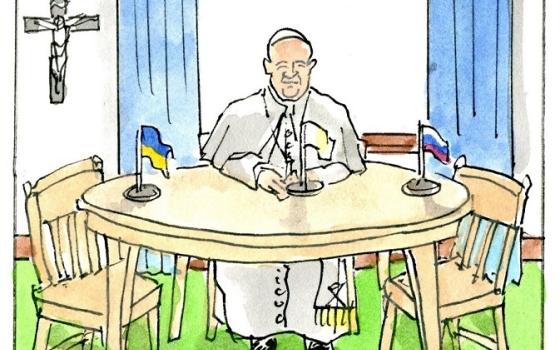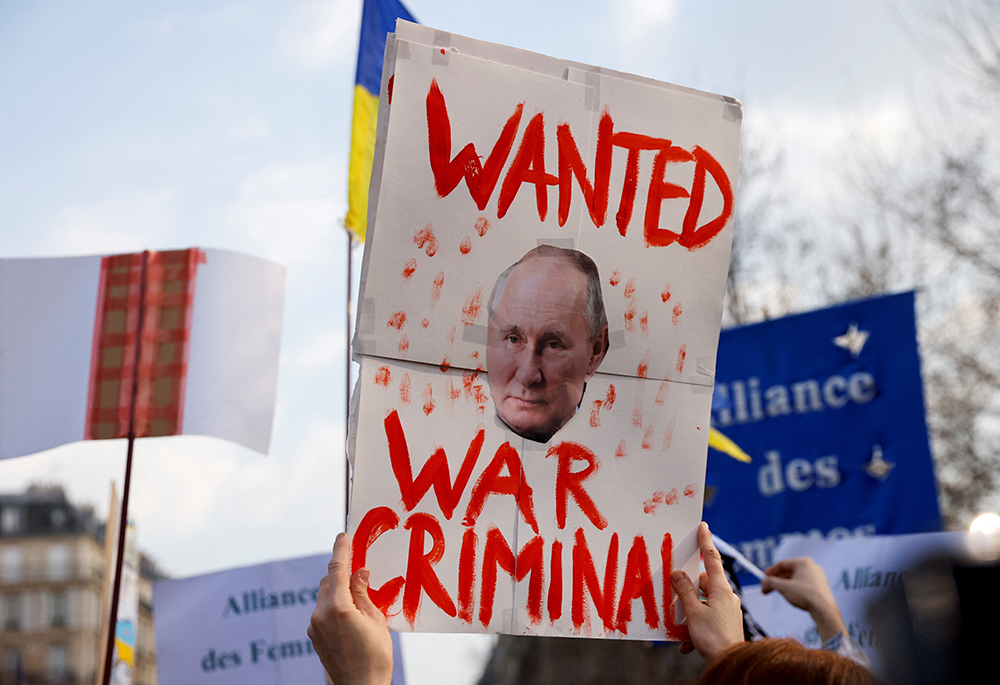
A person near the Place de la Republique in Paris holds a placard with an image of Russian President Vladimir Putin during an anti-war protest March 5, 2022, following Russia's invasion of Ukraine. (OSV News/Reuters/Johanna Geron)
In Ukrainian, Holodomor means death by forced hunger. It is what Josef Stalin did 90 years ago, starving about 3.9 million Ukrainians to death. Unfathomable as it may seem, Stalin and his underlings confiscated from the Ukrainians, all their crops, livestock, food from silos, warehouses, stores and homes. As food was disappearing, the authorities under order from Stalin prevented Ukrainians from migrating to safer havens in what became one of the most gruesome genocides in a century filled with horror.
Now, Russian President Vladimir Putin is tracing Stalin's footsteps, stealing Ukrainian grain from occupied lands, sabotaging the Nova Kakhovka Dam resulting in the destruction of agricultural lands, and ending the Black Sea Grain Initiative — which will make it impossible for Ukrainian food stocks to be shipped to Africa and Asian countries through the Black Sea. Removing Ukrainian grain from the market is forcing world food prices to escalate, exacerbating ongoing hunger issues in the Horn of Africa, Afghanistan and Yemen.
Russia's war on Ukraine has resulted in mined Ukrainian farmland taken out of production. Ukraine's fertile lands are saturated with explosives. To further drive home their disdain, Russians are striking port cities like Odesa and Izmail that ship the grain.
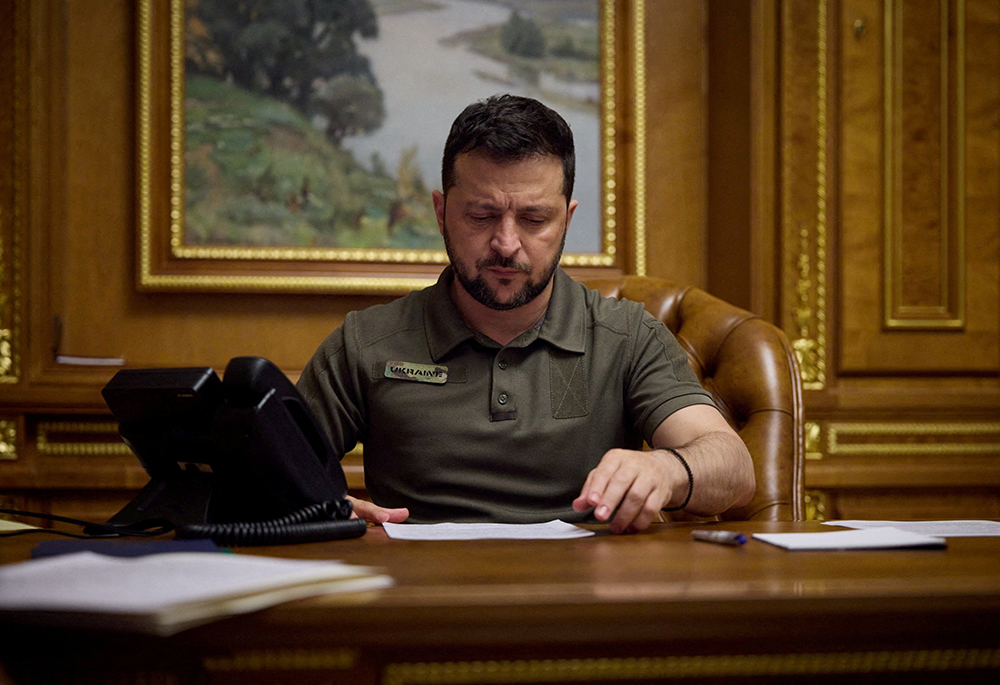
Ukraine's President Volodymyr Zelenskyy discusses a restoration of the Black Sea Grain Initiative with Turkish President Recep Tayyip Erdogan via a phone line in Kyiv in this file photo from July 27. (OSV News//Handout via Reuters/Ukrainian Presidential Press Service)
For now, Ukrainian President Volodymyr Zelenskyy is exploring moving grain through Romanian ports. Some have floated the idea of a NATO naval convoy to escort the grain haulers. But leaders in the West worry that the war will then widen. This same concern regarding potentially widening the war has restrained some of Ukraine's allies from providing fighter jets that could escalate the conflict.
Pope Francis recently addressed a crowd in St.Peter's Square, saying, "Beleaguered Ukraine, where war is destroying everything, even grain." The pope went on to say, "the cry of millions of brothers and sisters who are suffering from hunger rises to heaven."
Linda Thomas-Greenfield, U.S. ambassador to the United Nations, told the U.N. Security Council, "They [Russians] were exporting more grains [a benefit to Russian farmers] than ever before and at higher prices. Russia is simply using the Black Sea as blackmail. It's playing political games. It's holding humanity hostage."
As the U.N. General Assembly meets in New York this week, the evil of purposely weaponizing hunger once again by Russia needs to be addressed. It must be put in front of the International Criminal Court, which has already indicted the Russian president, accusing him of kidnapping Ukrainian children, and is looking at a long list of other war crimes by Putin and his military.
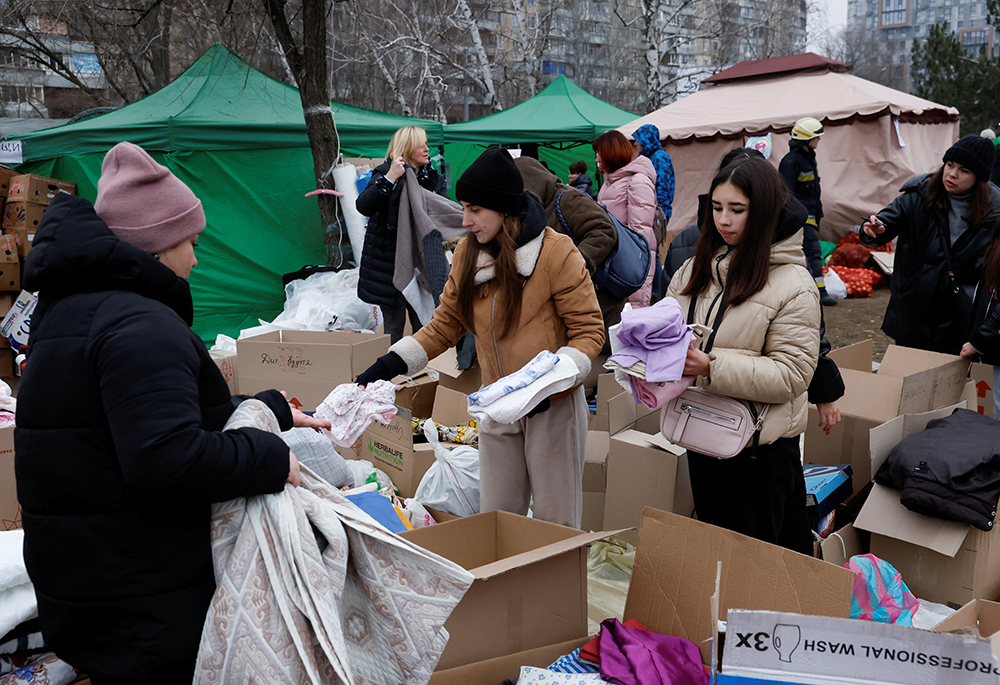
Humanitarian aid is delivered Jan. 16 after an apartment block was heavily damaged by a Russian missile strike in Dnipro, Ukraine. (OSV News/Reuters/Clodagh Kilcoyne)
In 1976, I was elected to the U.S. Congress as a representative for Macomb and St. Clair Counties in Michigan. I was new to Washington, as was a newborn hunger organization called Bread for the World. Founded by the Rev. Art Simon, the pastor of Trinity Lutheran Church on New York City's Lower East Side, its goal was to prevent hunger from occurring in the first place, rather than just reacting to it. Simon said, "It's better to put a fence at the top of a cliff than to have an ambulance at the bottom."
As a neophyte, I had the good sense to team up with a legislative pro: Hubert Horatio Humphrey, the former vice president of the United States who had returned to Congress as the senator from Minnesota. We both were interested in food and hunger issues.
With the support of Bread for the World, we worked together to require a hunger impact statement on all countries receiving U.S. foreign aid, underscoring the need to consider the country's track record on the fundamental human right for food. It passed the House and in the conference between the House and Senate, Humphrey was at the table to make sure it stayed in the bill. It was then signed into law by our new peanut farmer president from Georgia — Jimmy Carter.
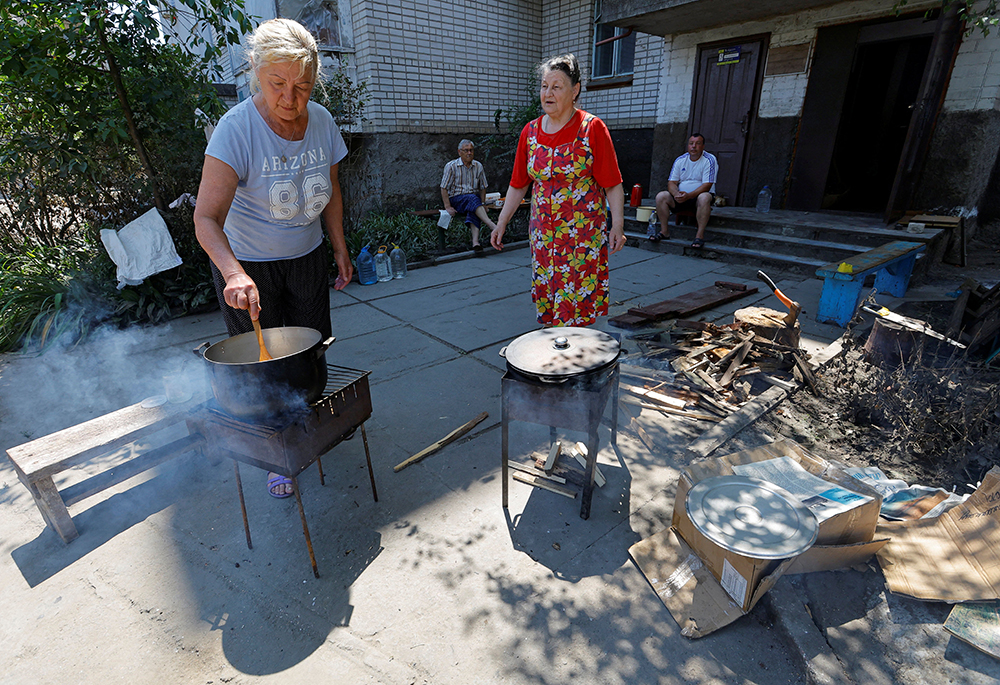
Local residents cook food outside an apartment building in the town of Hola Prystan in the Kherson region, Russian-controlled Ukraine, June 17, after floodwaters receded following the collapse of the Nova Kakhovka Dam in the course of Russia-Ukraine conflict. (OSV News/Reuters/Alexander Ermochenko)
The right to food is a basic human right recognized in the 1948 Universal Declaration of Human Rights. Yet, the number of undernourished people in the world keeps increasing. The U.N.'s Food and Agriculture Organization reports that in 2020, between 720 and 811 million people in the world faced hunger. And beyond hunger, one and in three people did not have access to adequate food in 2020. Since then, climate, war, inequality, and COVID-19 reversed the downward trend over the past decade. From 2019-2022 the number of undernourished people grew by 150 million.
Putin's war is only going to increase that number, putting the most vulnerable worldwide on the brink of famine. Undernutrition is connected to nearly half the deaths worldwide of children under 5 years old, according to UNICEF. The organization Embrace Relief reports that 66 million children of primary school age attend classes hungry across the developed world, 23 million of whom live in Africa.
How many emaciated children with skeletal bodies, bloated stomachs, and deadened eyes, are Putin and Russia prepared to sacrifice in their maddeningly immoral war? And how long is the rest of humanity prepared to let them get away with it?
Editor's note: David Bonior spent 26 years in the U.S. Congress representing Macomb and St. Clair counties in Michigan. In 1991 he was elected the Democratic whip, the No. 2 leadership position where he served for 11 years.
Bonior's grandparents migrated from Ukraine and Poland, and he was raised in his Ukrainian grandfather's home. In Congress he was active on Ukrainian related issues and has over the years visited Ukraine as it transitioned into a democracy with western values.
In March 2023, Bonior and Fr. Peter Daly, a retired Catholic priest and immigration lawyer, traveled to Poland and Ukraine to talk with Ukrainian refugees and their caregivers. They were accompanied by former Michigan Congressman Jim McDermott, who is also a psychiatrist, and Tanya Keppler, who works in information technology. They spent a week in Poland and a week in Ukraine; they have since written and spoken out about what they learned and experienced — bearing witness to the stories of Ukrainian refugees and their protectors.





